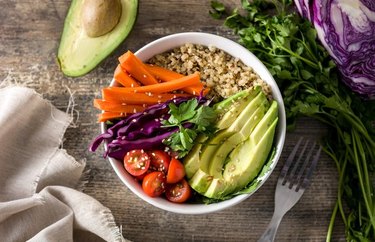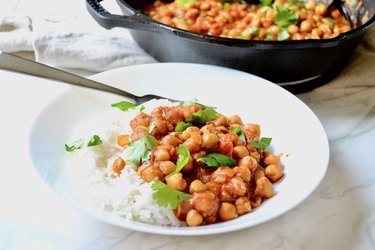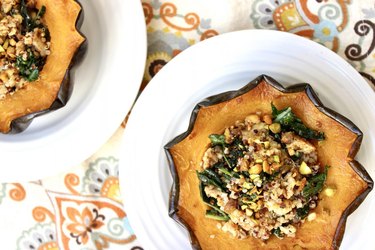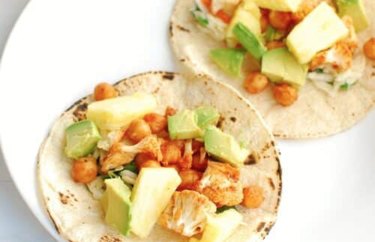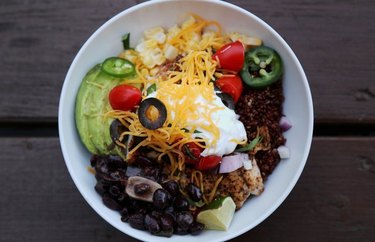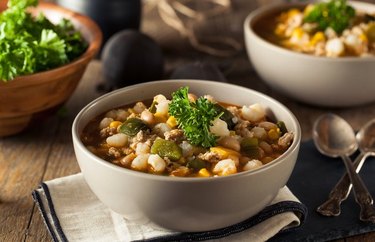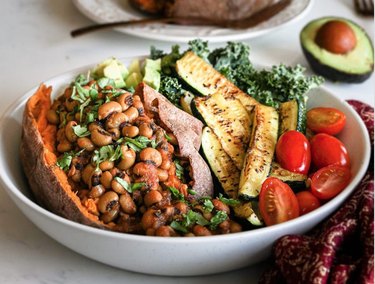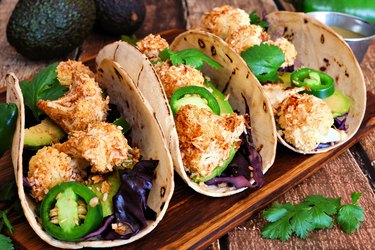
Perhaps you've been dealing with constipation. Will a high-fiber dinner help you become regular?
People are different, but pooping three times a day to three times a week fits within a normal regular bowel pattern, says Madathupalayam Madhankumar, MD, a family physician who specializes in surgical gastroenterology.
Video of the Day
Video of the Day
"One should pass the stool smoothly without any strain or effort. And, there should be a feeling of relief," Dr. Madhankumar says.
To stay regular, getting enough dietary fiber is necessary. Fiber helps relieve and prevent constipation by increasing the weight, volume and softness of the stool, making it easier to pass through the intestines for proper elimination, according to the Mayo Clinic. The 2020-2025 Dietary Guidelines for Americans suggests men and women get 14 grams of fiber per 1,000 calories we eat. So if you eat a 2,000-calorie diet, aim for 28 grams of fiber; for 1,600 calories per day, that's 22 grams of fiber.
While getting enough fiber is important, it's just as important to regulate your intake. Eating too much fiber at once can cause constipation, Dr. Madhankumar says.
So how much fiber should you aim for per meal? Dr. Madhankumar recommends a minimum of 5 to 7 grams of fiber per meal, with a maximum of 13 grams — adding that 8 to 10 grams of fiber (per meal) may be ideal for staying regular. "If the diet is filled with a good proportion of vegetables, fruits and grains, it would be easy to achieve the required fiber intake amount," he says.
Try these high-fiber dinner recipes rich in plant-based foods to get your bowels running smoothly.
1. Spicy Rainbow Quinoa Buddha Bowl
- Calories: 329
- Fiber: 13 grams
This Rainbow Quinoa Buddha Bowl has got enough protein and fiber to keep you satisfied — 13 grams of each! And it's a delightful blend of plant-rich foods: Carrots, broccoli, and purple cabbage add to the spectrum of color in this dish. Cruciferous broccoli and cabbage are low in calories, high in fiber and are excellent sources of vitamins A and C, according to the Academy of Nutrition and Dietetics.
Get the Spicy Rainbow Quinoa Buddha Bowl recipe and nutritional information here.
2. Chole (Indian Spiced Chickpeas)
- Calories: 312
- Fiber: 6.5 grams
Chickpeas are the basis of this warming dish, providing dietary fiber and some protein to boot. Onions, garlic, ginger and tomato provide antioxidant nutrients to this Indian spiced combo. Both onions and garlic contain organosulfur compounds that may help lower blood pressure and cholesterol, according to the Linus Pauling Institute. Served with brown rice, this is one satisfying, fiber-rich meal.
Get the Chole Indian Spiced Chickpeas recipe and nutritional information from Sarah Pflugradt Nutrition.
3. Vegan Stuffed Acorn Squash
- Calories: 484
- Fiber: 10 grams
With quality plant proteins at the center of this dish, you'll surely be satisfied. Tempeh and quinoa provide the majority of the protein, but you'll also get some from the pistachio and kale, says Kelly Jones, RD. The mixture is seasoned delightfully with savory herb vinaigrette and packed deliciously in the center of the squash. Because this Vegan Stuffed Acorn Squash is plant-rich, it packs 10 grams of fiber per serving.
Get the Vegan Stuffed Acorn squash recipe and nutritional information from Kelly Jones Nutrition.
4. Vegan BBQ Cauliflower and Chickpea Tacos
- Calories: 240
- Fiber: 7 grams
Oven-roasted chickpeas and cauliflower are the "meat" of this taco. While further studies are warranted to assess their anti-cancer potential, cruciferous vegetables are associated with a lower risk of both colon and stomach cancers, according to a 2018 article in Molecular Nutrition Food Resources.
Get the Vegan BBQ Cauliflower and Chickpea Tacos recipe from Snacking in Sneakers.
5. Quinoa 'Taco' Bowl
- Calories: 478
- Fiber: 11 grams
Slow-simmered beans and juicy chicken are paired with quinoa, corn and avocado in this colorful, nutrient-dense bowl. Both beans and quinoa add plenty of fiber and plant-based protein to the mix. Quinoa, a gluten-free ancient grain, is one of the few plant foods with all nine essential acids, deeming it a complete source of protein, according to the Harvard T.H. Chan School of Public Health.
Get the Quinoa 'Taco' Bowl recipe and nutritional information here.
6. Winter White Chili
- Calories: 336
- Fiber: 10 grams
This protein-rich Winter White Chili is seasoned with onion, garlic, jalapeno, oregano and just a touch of cinnamon. It's prepared with tomato-free vegetable broth, keeping this chili mostly monochromatic. White beans, filling the bulk of this recipe, are a great source of protein and fiber.
Get the Winter White Chili recipe and nutritional information here.
7. Slow Cooker Vegan Black Eyed Peas
- Calories: 241
- Fiber: 8 grams
Black-eyed peas, the star of this meal, can elevate variety and nutrition into your meals. These distinguishable legumes (they're white with black dots) are a practical staple and provide 8 grams of protein and 6 grams of fiber per 1/2 cup cooked, according to the USDA. Tomatoes provide additional fiber, bumping the quantity to 8 grams in this savory, legume-rich dish. With a mix of cumin, paprika and other warming spices, this comforting dish is sure to pack in the flavor.
Get the Slow Cooker Vegan Black Eyed Peas recipe and nutritional information from Desi-Licious RD.
- Mayo Clinic: "Dietary Fiber: Essential for a Healthy Diet"
- 2020-2025 Dietary Guidelines for Americans
- USDA: "Black Eyed Peas"
- Linus Pauling Institute: "Garlic and Organosulfur Compounds"
- Foods: "Curcumin: A Review of Its’ Effects on Human Health"
- Molecular Nutrition and Food Resources: "Cruciferous Vegetables and Risk of Cancers of the Gastrointestinal Tract"
- USDA: "Avocado"
- Harvard T.H. Chan School of Public Health: "Quinoa"
- Eatright.org: "The Beginners Guide to Cruciferous Vegetables"
- Healthline: "Nutrients in White Beans"
- Harvard Health Publishing: "The Importance of Potassium"
